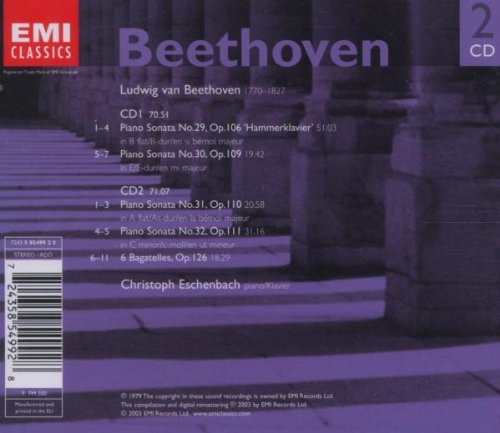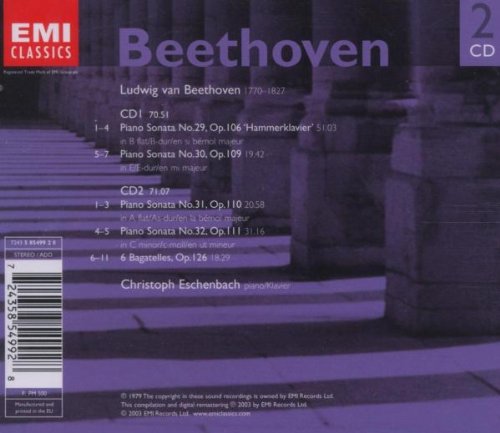Beethoven: Piano Sonatas 29, 30, 31 & 32; Bagatelles, Op. 126; Christoph Eschenbach
$105.97 $92.15
The Late Sonatas were some of Beethoven’s most difficult works and some of today’s most difficult repertoire. Yet again, his music found a new path. At this time, his Classical style and hearing completely vanished, replaced by the origins of Romantic music. The Hammerklavier was deemed to be Beethoven’s most difficult sonata yet. In fact, it was considered unplayable until almost 15 years later, when Liszt played it in a concert. The Bagatelles, Op. 126, dedicated to his brother Johann and published late in his career, in 1825, were his final work for piano. A bagatelle, in Beethoven’s usage, is a kind of brief character piece. Beethoven wrote to his publisher Schott that the Opus 126 Bagatelles “are probably the best I’ve written”. German pianist and conductor Christoph Eschenbach (born Breslau [now Wrocław], 1940) studied in Cologne and Hamburg with Hans Schmidt-Neuhaus and Eliza Hansen. In 1965 he was awarded first prize in the first Concours Clara Haskil in Switzerland, launching him on a successful concert career that has taken him to most parts of the world. As a pianist he plays a wide repertory ranging from the Baroque period to the 20th century; but it is for his carefully worked and poetic performances of Beethoven, Mozart, and Schubert that he is most highly regarded. He is a noted lieder accompanist and has performed frequently in a piano duo with Justus Frantz, with whom he has made distinguished recordings of works by Mozart and Schubert. In 1966 he made his recital and concert débuts in London and in 1968 he gave the première in Bielefeld of Henze’s Second Piano Concerto, written for him.
Product information |
|||||||||||||||||||||||||||||||||||||||||||||
|
Only logged in customers who have purchased this product may leave a review.









Reviews
There are no reviews yet.